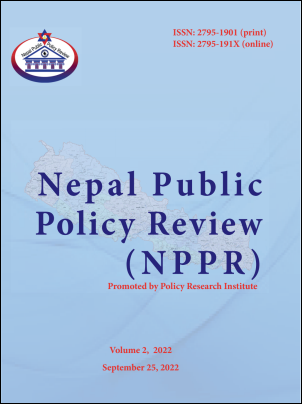Governance of Asta-Ja Resources in Nepal
Keywords:
Asta-Ja, Governance, Natural Resources, Human Resources, Policies, NepalAbstract
Nepal is endowed with vast natural and human resources, collectively called "Asta-Ja" resources. Asta-Ja means eight Ja, Nepali letter "Ja", Jal (water), Jamin (land), Jungle (forest), Jadibuti (medicinal and aromatic plants), Janashakti (human resource), Janawar (animals), Jarajuri (crop plants), and Jalabayu (climate). Sustainable management of Asta- Ja resources constitutes the major goal of the government of Nepal. Governance of Asta- Ja resources must enhance accelerated economic growth and fast-paced socio-economic transformation of the society while addressing the issues of social and climate justice, inclusion, and other inequalities. A step-by-step, theoretically grounded, inclusive, participatory, and comprehensive Asta-Ja Governance Framework (Asta-Ja GF) are proposed for the best governance of Asta-Ja resources in Nepal. The Asta-Ja GF consists of seven steps, 1) status and linkages of Asta-Ja resources, 2) resources ownership, 3) policies and practices, 4) community engagement, 5) incentives and revenue sharing, 6) infrastructure investment, and 7) monitoring, evaluation, and reporting are proposed. Institution building at the local, regional, and national levels for effective governance of Asta-Ja resources is emphasised. This paper thus studies the Asta-Ja Framework in the purview of laws, policies and plans adopted by the country for the sustainable development and utilisation of natural resources. The paper also enlists the reasons why there is a need for effective governance of Asta-Ja.
Downloads
Downloads
Published
How to Cite
Issue
Section
License
Copyright (c) 2022 Durga Dutta Poudel

This work is licensed under a Creative Commons Attribution-NonCommercial 4.0 International License.




